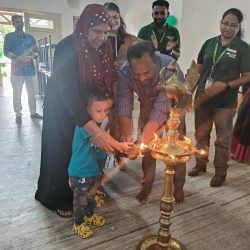Ujwal – from hopelessness to empowerment
Pallium India, in association with the Federation of Malayalees Associations of Americas (FOMAA), has launched a project to support women who live with life-limiting conditions and women who care for people with life-limiting conditions.
Globally, women patients tend to receive fewer services. Similarly, women constitute more than 80 percent of caregivers whose services often go unrecognized. In countries like India, women may not have their own income and their day–to–day existence becomes precarious if the male breadwinner becomes seriously ill or incapacitated. These women may become liable for any debts incurred by the male member of the family and often run into further debt in caring for their family members. Society tends to ignore the physical and emotional stress faced by women caregivers since their domestic work, in any event, is not acknowledged. Unlike that of men, women’s mobility is scrutinized, restricting their movement outside of their homes. The need for respite for women caregivers is rarely acknowledged.
In this context, Pallium India and the Women’s Forum of FOMAA have initiated a project in Trivandrum to focus on women patients and women caregivers. As a start, eight women caregivers were provided support for income-generation activities. The project, aptly named Ujwal (brightness against darkness), aspires a transition “from helplessness to empowerment” by implementing a variety of programs.

Image: Dr Rajagopal handing over the check to Mr Francis Ernest, volunteer, to support women caregivers in their palliative care clinic
Here are some of the beneficiaries of this program:
Valsala (name changed) used to make home-made cakes for a living before they were forced to sell their oven and other equipment to cover her husband’s treatment. Based on an assessment made by the Pallium India team, a budget of ₹42,800 was approved to enable her to buy an oven, and materials required for making cakes, as well as support for paying electricity bill. Pallium India envisages that she will be self-sufficient after six months to meet all the expenses involved in running her business.
Beena (name changed) had discontinued her garment business due to the expenses she incurred for her husband’s treatment. She requested assistance from Pallium India for a small investment to purchase garments for selling locally. She also proposed buying a two-wheeler so that she could reach more people. Pallium India is supporting her by providing a sum of ₹15,000 for her garment business, and later, may also consider offering her a two-wheeler.




